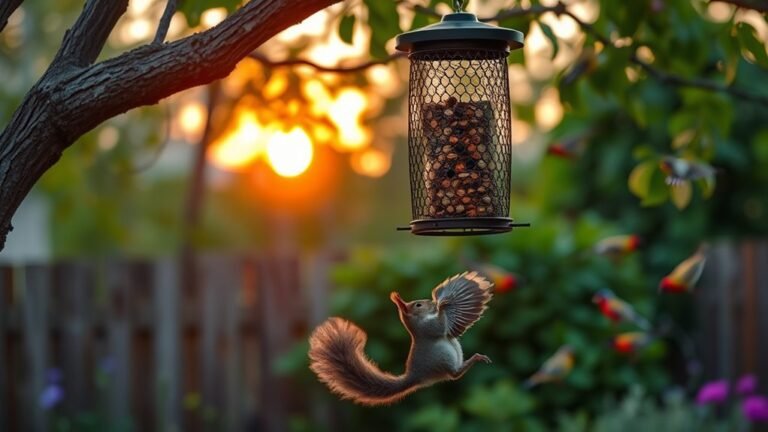Effective Techniques to Stop Birds From Nesting
If you have birds nesting on your property, it is important to take steps to stop this. Several techniques can help. You can install physical barriers or use natural repellents to make the area less inviting for the birds. These methods allow you to manage the situation without harming the birds. Let's look at effective strategies to ensure birds think twice before making your property their home.
Key Takeaways
- Install bird spikes or netting to prevent birds from landing and nesting on ledges, rooftops, and garden areas.
- Create an unwelcoming environment by trimming shrubs, cleaning areas, and using natural repellents like peppermint oil.
- Utilize visual deterrents such as decoys of predators and reflective materials to discourage nesting.
- Employ sound repellents, including sonic devices that mimic predator calls or ultrasonic sounds, to deter birds.
- Provide alternative nesting options away from buildings by offering birdhouses situated in less desirable locations for nesting.
Install Physical Barriers and Deterrents

To stop birds from nesting in unwanted areas, install physical barriers.
These barriers block sightlines, making your property less appealing as a nesting site. Use nets or screens as they provide effective visual deterrents without harming the birds.
You can also provide birdhouses away from your building. This gives birds a better alternative for nesting while protecting your space.
Keeping your environment clutter-free reduces potential nesting sites, further discouraging birds from settling in unwanted areas.
Use Bird Spikes and Netting
To keep birds from nesting in unwanted areas, use bird spikes and netting.
Bird spikes stop birds from landing on ledges, rooftops, and other surfaces. They're simple to install and effective.
Netting also offers protection by covering trees, gardens, or eaves, making it impossible for birds to nest there.
By using these solutions, you can safeguard your property.
Bird spikes and netting create a barrier that helps maintain a peaceful coexistence between nature and urban settings.
Implement these measures to keep your environment free from nesting issues, making your space inviting and bird-free.
Implement Scare Tactics

To effectively keep birds from nesting in your area, you can use scare tactics. One method is to place decoys that resemble predators, like owls or hawks. Position these decoys around your property to make birds feel threatened. Choose realistic decoys, and move them regularly to keep their impact strong.
Another useful tactic is to use reflective surfaces, such as aluminum foil strips or shiny Mylar tape. Hang these around areas where birds might want to nest. The shiny surfaces create visual disturbances that birds find unappealing.
Using both decoy predators and reflective materials will help create an environment that discourages nesting. This approach promotes a bird-free space while still allowing you to enjoy your surroundings.
Create Unwelcoming Environments
To deter birds, you can create unwelcoming environments. Start by changing their habitat. Trim shrubs and trees to remove potential nesting spots.
Clean areas where birds often gather to make them less inviting. Use natural repellents like peppermint oil or a vinegar-water mix in key areas to help keep birds away without harming them.
Block entry points around your property with mesh or netting to prevent nesting. Make sure your garden and outdoor spaces have fewer food sources—pick up fallen fruit and secure trash cans.
These actions will help make your home less appealing to birds and keep your living space harmonious.
Utilize Sound Repellents

Have you thought about using sound to keep birds away? Sound repellents can help deter birds from nesting in your area. Sonic devices make noises that imitate predator calls, making the space feel unsafe for birds.
Ultrasonic devices emit sounds that humans can't hear but can disrupt bird behavior, encouraging them to leave.
Place these devices in areas where birds often gather. Adjust the settings and move the devices regularly to keep them effective.
Using sound repellents along with other methods can improve your results. By using these strategies, you can create a safer space while preventing unwanted nesting.
Seek Professional Help if Necessary
If sound repellents aren't working, consider getting professional help. Experts in bird behavior can provide solutions that you mightn't think of. They understand nesting patterns and can offer effective strategies that are safe for the environment and local wildlife.
These professionals can identify what attracts birds and recommend safe ways to deter them. They may also suggest changes to your property to prevent future nesting. Working with specialists can lead to better results and show a sense of responsibility for local birds.
A balanced approach helps keep nature beautiful while protecting your space.
Frequently Asked Questions
What Are the Legal Considerations for Relocating Bird Nests?
When relocating bird nests, follow the rules about nest relocation and migratory bird laws. Ignoring these rules can lead to legal problems. Always check with local wildlife authorities before taking any action. This will help ensure you stay compliant and protect the birds.
Can Bird Repellents Harm Pets or Wildlife?
Bird repellents can harm pets or wildlife, depending on their ingredients. Choose natural and pet-safe bird repellents to lower this risk. This way, you can keep your home friendly for both birds and pets.
How Do Seasonal Changes Affect Bird Nesting Behavior?
Seasonal changes significantly affect bird nesting behavior. As temperatures increase, birds returning from migrations look for suitable nesting materials. They adapt their strategies to ensure safe and effective reproduction during each season's ideal conditions. Warmer weather helps birds find food and build nests more efficiently. Understanding these behaviors can enhance our appreciation for birds and their life cycles.
Are There Specific Bird Types That Are Harder to Deter?
Certain common nuisance birds, such as sparrows and starlings, can be difficult to keep away. To effectively deter these birds, you should use clear methods like physical barriers or noise devices. These techniques help protect your area from their presence.
What Should I Do if Birds Still Return After Deterrents?
If birds keep coming back, try using different deterrents like visual or sound-based repellents. You can also change the environment, like removing food sources or altering their nesting spots. These steps can help keep birds from nesting in your area for a longer time.

Hello, I’m Amelia White, the founder of birdsfanatic.com. As a lifelong bird enthusiast and spiritual seeker, I’ve always been fascinated by the mystical connections between birds and the human experience. On this site, I share my knowledge and insights into the symbolic meanings and spiritual significance of various bird species, exploring their roles in mythology, folklore, and cultural traditions. Join me on this journey into the world of birds, where we’ll discover the hidden wisdom and guidance that these magnificent creatures have to offer.







